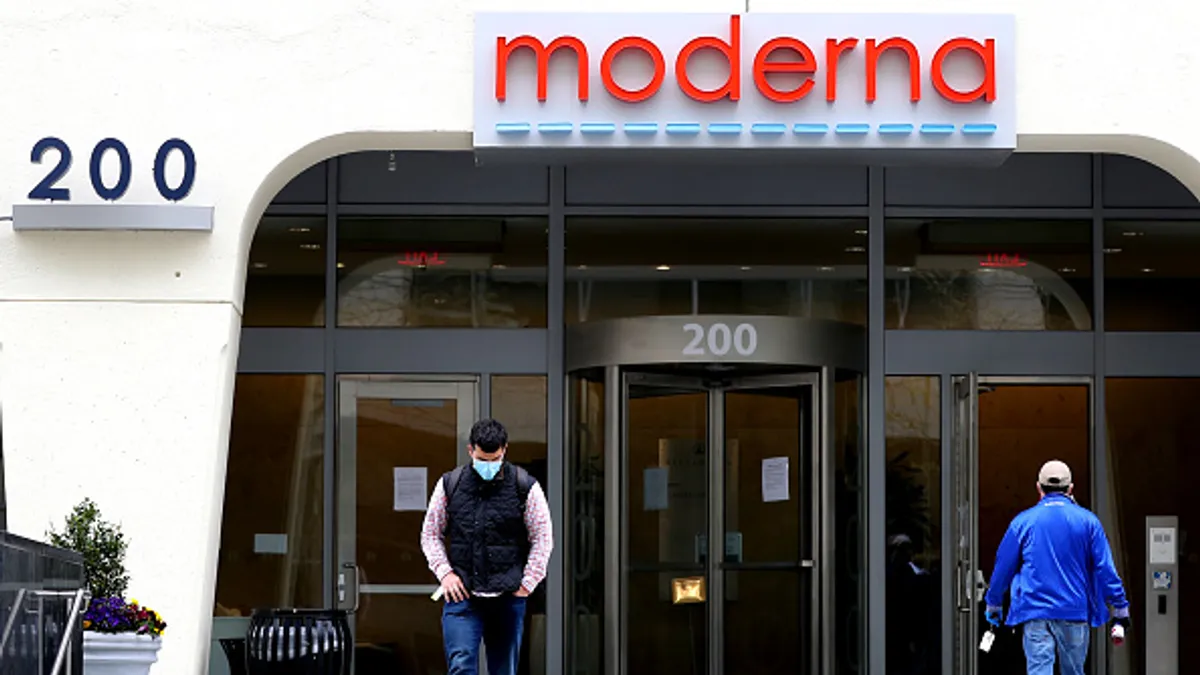A hitherto unknown virus spread across the globe. Entire cities and nations on lockdown. A global public health emergency.
Faced with these challenges, Stéphane Bancel, CEO of Moderna, one of the pharmaceutical companies that went on to develop a COVID-19 vaccine, had a leadership task for the ages. But through it all, Bancel told attendees of an April 7 Harvard Business Review virtual event that Moderna's progression felt natural, if anything.
"The thing that has been quite interesting about this crisis was that it might have been the easiest leadership task I ever had to do in the last 25 years of my career," he said. "People had an incredible sense of responsibility to society and their fellow human beings."
Moderna made use of sophisticated technologies, some of which were so advanced, per Bancel, that the company's staff had only very recently been able to work with them hands-on. That was not a deterrent, as Moderna had long had an interest in innovations that "no one believed could work," he said, referencing past commentary that compared the company unfavorably to failed blood testing startup Theranos. Employees, moreover, were driven by the life-saving potential of their work, Bancel continued, so the company did not have to be prescriptive about their duties.
"In this incredible race, never once did I have to ask people to do more, to try harder, to work harder, to join a WebEx on the weekend," he said. "People did what had to be done."
It is a theme that resonated throughout conversations between HBR moderators and executives from Salesforce, Walmart and others. To navigate through the past two years, these leaders sought connection — and common purpose — with their workers.
A changing role
In business school, Salesforce CEO Marc Benioff said, classes on stakeholder capitalism, or business practices that focus on benefitting all stakeholders of an organization rather than shareholders alone, did not exist.
Today, stakeholder capitalism is one of many forces changing the role of CEO, he noted, and employees have emerged as a key stakeholder group.
"Our employees care where they work," Benioff said. "They care about what the company does and what it stands for, and they hold me accountable for that. They hold me accountable for their core values."
He referenced a 2015 episode in which he posted on Twitter opposing an Indiana religious freedom law following internal discussions about the law's potential impact on employees. It was an example, Benioff said, of the need for CEOs to listen to employees and earn their trust.
"I have a responsibility to listen to them and in some ways represent them," he added.
Organizations, particularly those operating internationally, leaned heavily on their local representatives to stay afloat during the pandemic. Judith McKenna, president and CEO of Walmart International, said the retail giant relied on executives within international markets when discussing and leveraging strategies, particularly for high-priority initiatives like online grocery rollout and e-commerce.
Of particular importance was distributing those lessons effectively, given that different markets were in different stages of development, McKenna said, and tailoring those processes to each market's customer base. "Those great [executives] around the world tell us instantly when we're getting it wrong," she added.
Listening is only part of the equation, however. Employers also must be "crystal clear" with employees about what their organizational values are, Benioff said; "Every CEO needs a business plan [that] is operationalizing those core values into what we do every day."
Emphasis on interactivity
The move to remote work brought with it a need to adjust communication processes. For McKenna, who had previously been accustomed to frequent global travel to Walmart's various international markets before the pandemic, that meant numerous Zoom calls were conducted in her Bentonville, Arkansas, living room.
Though it was an experience she said she "wouldn't recommend" to attendees, McKenna said the move to remote work tested Walmart's ability to innovate and look at its operations differently. Previously, the company had never held a town hall meeting connecting its entire global operations simultaneously. Now, it was doing just that, as well as determining how to conduct virtual visits to international stores.
Walmart was still productive working virtually, McKenna said, but she missed the ability to speak with associates outside of meetings and get acquainted with the work they had been doing on the ground.
A positive outcome through this period, however, is that Walmart has become more adept at sharing information between global locations and putting leaders in these locations in touch with one another. "I hope one of the things that comes out of this is that the partnership is stronger than it ever has been before."
As employers seek to move forward with hybrid work strategies, they will need to train both managers and non-managers to develop trust and connection with their team members, including those who may not be located elsewhere, said Tsedal Neeley, Naylor Fitzhugh professor of business administration and senior associate dean for faculty development and research at Harvard Business School.
Additionally, employers will need to have a centralized approach to hybrid work, Neeley said, particularly around questions such as when employees need to come to the office and work from home. Otherwise, managerial biases could creep into these decisions, or an "us versus them" mentality could develop between employees who work at different locations or at different times of day. "But if you have a centralized approach, you won't have these inequities," she said.
At an even broader level, leaders have been tasked with emotionally supporting workers and checking in with them to assess hybrid work transitions on an individual level. They also need to be mindful that different employees will seek different arrangements in the post-pandemic environment; effusive praise of returning to the office may clash with workers who seek more flexibility or a hybrid work option.























